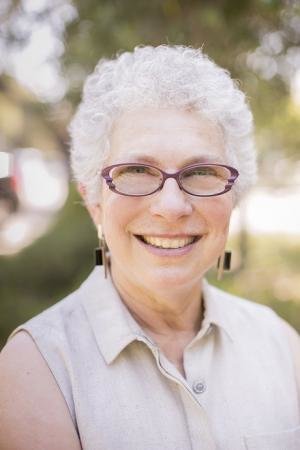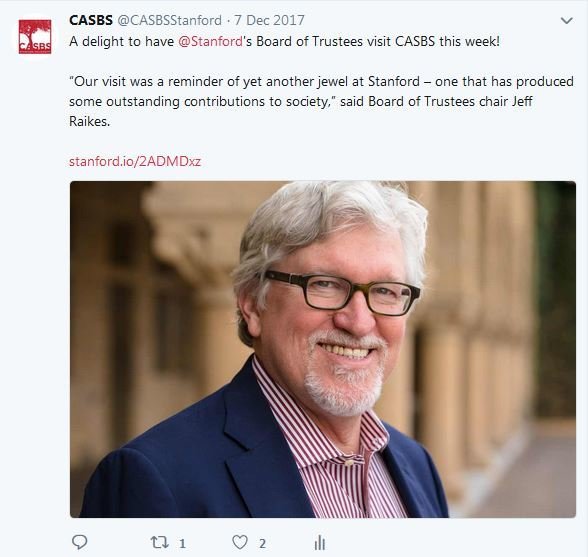
I now am completing my fourth year at CASBS, and I feel we’re making the progress I had hoped to see.
When I arrived, we were housing fewer than 30 fellows, and that number depended on a large percentage of non-subsidized returning fellows. We now are able to host approximately 40 first-rate fellows each year, nearly all of whom are coming to CASBS for the first time and of whom more than a third are now affiliated with one of our ongoing projects. We are beginning to attract significant, ongoing support from major foundations as well as greater levels of contributions from our board members, former fellows, and a number of new donors.
Our success is based largely on the intellectual contributions we are making to our disciplines, Stanford, the Silicon Valley community, and the wider world. The CASBS mission is to advance the understanding and application of knowledge of human beliefs, behavior, and institutions. Our multi-year projects draw on our fellows, past and present, and attract new fellows. This gives the projects extraordinary scholarly authority, which is then enhanced by bringing into the collaborations thinkers and experts from a wide range of disciplines and sectors. Several projects build on partnerships with other centers and programs at Stanford, and consequently we have enhanced our reputation on the campus as a go-to location for the integration of social scientific thinking into a large range of issues and subjects.
Evidence of the Center's growing reputation on the campus was the visit by the Stanford Board of Trustees in December. They came up the hill for lunch and a presentation. For many it was not only the first time to see the place; it was also the first time they had heard of us. Others thought of CASBS only as a location for fellows; we emphasized it is also a site of generative collaborations and networks. Most seemed impressed by the roster of former fellows, or "ghosts," who have occupied our studies, the current fellows we showcased, and our multi-year projects.
The effects of our projects are not just localized, however. For example, the Future of Work and Workers project has drawn official visits from a group of German parliamentarians, the Danish Confederation of Enterprises, and Senator Michael Bennet of Colorado and his staff. Another result of that project is that I was asked to co-chair and help develop the program and follow-up for a meeting on “Technology and the Future of Work,” jointly sponsored by the American Academy of Arts and Sciences and the Royal Society of Britain.

CASBS outreach also is improving. Our public symposia series now has grown a substantial audience, with a large waiting list to attend each symposium. We have begun live-streaming our events and are planning more symposia for future years. Regular salon talks at The Interval in San Francisco and Talks at Google featuring our fellows are elevating our name recognition. In addition, we now are taking CASBS on the road. We held a second salon talk at Soho House in West Hollywood (co-hosted by the Berggruen Institute, featuring fellows John Markoff and Arati Prabhakar talking about technology and society, and complete with coverage by The Hollywood Reporter), and our first in Miami at the de La Cruz Collection (featuring fellow Nate Persily discussing the effects of the internet on democracy). In all cases, we reached-out to Stanford alumni but also to a curated list of influentials in the community. If success is measured only in immediate donations, these events have been but moderately successful. But we are playing a long game here, cultivating recognition for CASBS and the important role it plays in generating exciting new thinking, research and practice. Moreover, several of these events already have paid off in other ways: access to large amounts of data from gaming company Twitch for our iGen project, access to broadcasters at Twitch for an experiment one of our fellows plans to run, some discussion of new fellow support from at least one new donor, and an interesting array of new people who have been visiting and seeking ways to help, support, and work with us. We’ve also received great feedback on our print collateral and web site that will lead to significant improvements in both.
My visits to Singapore, Taiwan, and Hong Kong in 2016 also are delivering positive returns to CASBS. We now have arrangements with the National University of Singapore and the Taiwanese Science and Technology Policy Research and Information Center (STPI), and are negotiating with the Chinese University of Hong Kong (CUHK) to support fellows who also undergo our own rigorous selection process. The result is greater diversity at CASBS and a real foothold in Asia. One of my hopes is to extend our global geographic reach into Latin America, Africa, and the parts of Europe where we are not already known. Our projects and networks will be the real beneficiaries, widening our perspectives and bringing the best scholars world-wide into the mix.
I believe CASBS has arrived at its second inflection point during my directorship. We are now stable in terms of fellowship class size and in relation to finances for our basic costs. We have made real progress in terms of generating influential projects and networks. We are ready to take the next step in making the Center once again the model for a new iteration of an institute for advanced study, one based on a foundational fellowship program but using it to help incubate exciting breakthroughs in collaborative thinking and research.
Sincerely,

